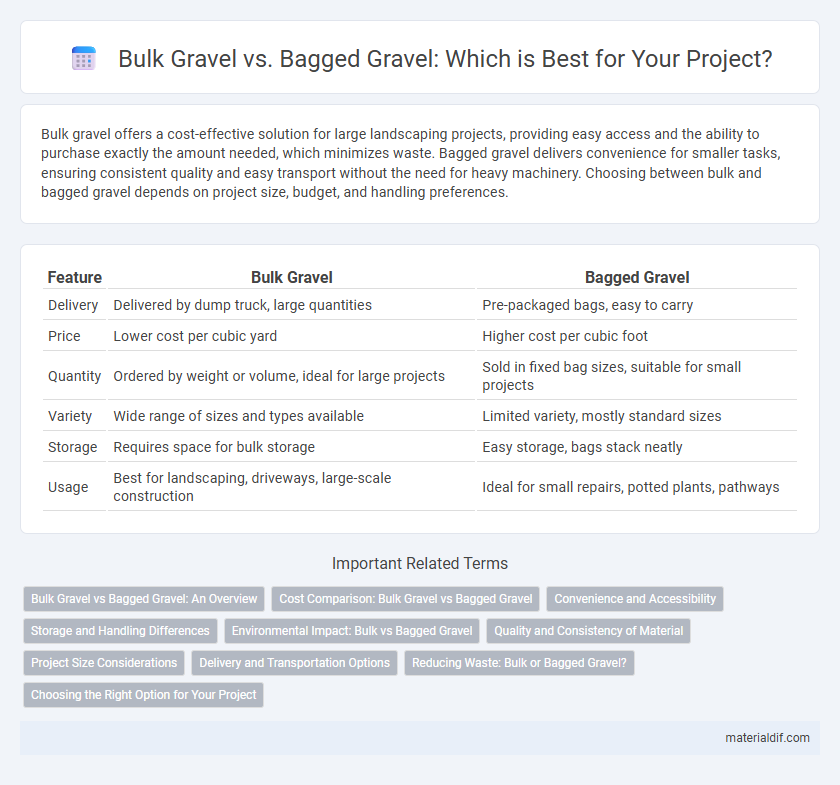Bulk gravel offers a cost-effective solution for large landscaping projects, providing easy access and the ability to purchase exactly the amount needed, which minimizes waste. Bagged gravel delivers convenience for smaller tasks, ensuring consistent quality and easy transport without the need for heavy machinery. Choosing between bulk and bagged gravel depends on project size, budget, and handling preferences.
Table of Comparison
| Feature | Bulk Gravel | Bagged Gravel |
|---|---|---|
| Delivery | Delivered by dump truck, large quantities | Pre-packaged bags, easy to carry |
| Price | Lower cost per cubic yard | Higher cost per cubic foot |
| Quantity | Ordered by weight or volume, ideal for large projects | Sold in fixed bag sizes, suitable for small projects |
| Variety | Wide range of sizes and types available | Limited variety, mostly standard sizes |
| Storage | Requires space for bulk storage | Easy storage, bags stack neatly |
| Usage | Best for landscaping, driveways, large-scale construction | Ideal for small repairs, potted plants, pathways |
Bulk Gravel vs Bagged Gravel: An Overview
Bulk gravel offers cost efficiency and convenience for large landscaping or construction projects by allowing customization of quantity and reducing packaging waste. Bagged gravel provides easy handling and storage, ideal for small-scale projects or decorative uses, with consistent quality and size per bag. Choosing between bulk and bagged gravel depends on project scale, budget, and application requirements.
Cost Comparison: Bulk Gravel vs Bagged Gravel
Bulk gravel typically costs between $10 and $50 per ton, offering significant savings for large landscaping projects compared to bagged gravel, which ranges from $3 to $5 per 50-pound bag. Purchasing gravel in bulk reduces packaging waste and transportation costs, making it more cost-effective for quantities exceeding one cubic yard. For small projects, bagged gravel provides convenience but at a higher per-unit price, making bulk gravel the preferred choice for budget-conscious consumers handling larger volumes.
Convenience and Accessibility
Bulk gravel offers greater convenience for large-scale projects by allowing homeowners and contractors to order precise amounts delivered directly to job sites, reducing the need for multiple trips. Bagged gravel provides enhanced accessibility for small tasks or limited spaces, easily transported and stored without heavy equipment. Choosing between bulk and bagged gravel hinges on project size, access to delivery, and storage capacity.
Storage and Handling Differences
Bulk gravel requires ample open storage space and heavy machinery for efficient handling, suitable for large-scale landscaping or construction projects. Bagged gravel offers convenience with manageable 50-pound bags that are easy to transport, store in limited spaces, and handle manually for smaller jobs. Storage conditions vary as bulk gravel should be protected from excessive moisture to prevent clumping, while bagged gravel remains dry if stored indoors, maintaining its quality longer.
Environmental Impact: Bulk vs Bagged Gravel
Bulk gravel typically has a lower environmental impact than bagged gravel due to reduced packaging waste and lower transportation emissions per volume. Bagged gravel often requires more plastic or paper packaging materials, contributing to landfill waste and increased carbon footprint from manufacturing. Choosing bulk gravel supports sustainability by minimizing resource use and promoting more efficient delivery methods.
Quality and Consistency of Material
Bulk gravel typically offers greater consistency in material quality, sourced directly from quarries and delivered in large quantities, ensuring uniform size and composition ideal for extensive landscaping projects. Bagged gravel, while convenient for small-scale use, may vary in quality and size due to inconsistent packaging and multiple suppliers, impacting its suitability for precision applications. Selecting bulk gravel often guarantees better material control and overall project durability compared to bagged alternatives.
Project Size Considerations
Bulk gravel offers cost efficiency and convenience for large-scale projects like driveways or landscaping over extensive areas, reducing multiple delivery fees and packaging waste. Bagged gravel suits smaller projects or precise applications, such as garden beds and pathways, providing easy transport and controlled quantity usage. Evaluating project size helps determine whether bulk or bagged gravel optimizes budget, labor, and material handling.
Delivery and Transportation Options
Bulk gravel offers more economical delivery for large landscaping or construction projects, typically transported by dump trucks that allow for easy offloading directly at the site. Bagged gravel provides convenience and portability, making it ideal for smaller projects or areas with restricted access, with delivery often handled via standard parcel services or smaller trucks. Transportation costs for bulk gravel generally remain lower per ton due to volume discounts, while bagged gravel can incur higher expenses due to packaging and handling fees.
Reducing Waste: Bulk or Bagged Gravel?
Bulk gravel significantly reduces packaging waste compared to bagged gravel, as it eliminates the need for individual plastic or paper bags. Delivering gravel in bulk allows for precise measurement based on project requirements, minimizing leftover materials that often result in disposal issues. Choosing bulk gravel supports more sustainable construction practices by decreasing landfill contributions from packaging debris.
Choosing the Right Option for Your Project
Bulk gravel offers cost-effectiveness and is ideal for large-scale landscaping, driveways, and construction projects due to its lower price per ton and flexible delivery options. Bagged gravel provides convenience, precise quantity control, and ease of transport, making it suitable for small DIY projects, garden pathways, or decorative features. Evaluate project size, budget, and handling capabilities to determine whether bulk gravel or bagged gravel best meets your material needs and logistical preferences.
Bulk Gravel vs Bagged Gravel Infographic

 materialdif.com
materialdif.com